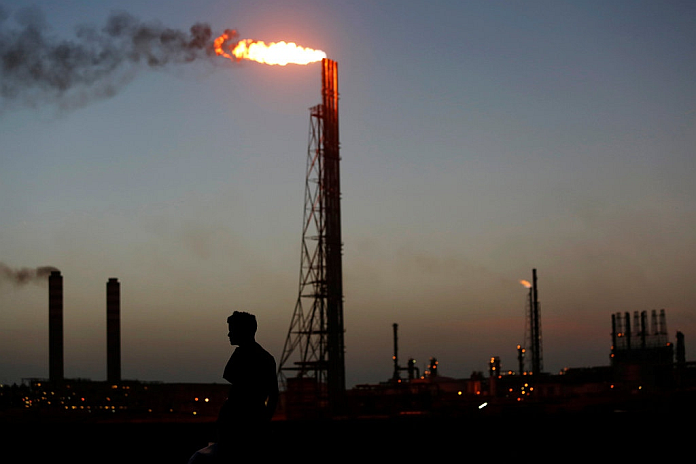By Andreína Chávez Alava
CARACAS, Venezuela, (venezuelanalysis.com) – Venezuela’s oil production has stagnated while recently renewed crude shipments to Europe boosted exports.
According to secondary sources from the latest Organization of Petroleum Exporting Countries (OPEC) report, Venezuela’s June oil output stood at 706,000 barrels per day (bpd), falling behind May’s 720,000 bpd and April’s 721,000 bpd. For its part, Venezuelan state oil company PDVSA reported 727,000 bpd, below the previous month’s 735,000 bpd.
Despite the production slide, Venezuelan exports bounced back with the country shipping an average of 630,500 bpd of crude and fuel in June. The number represents a 61 percent increase compared to May, when sales reached their lowest level in 19 months, reported Reuters.
The new surge in exports comes as a result of restored oil-for-debt swap deals between Caracas and Italy’s Eni and Spain’s Repsol. In May, the US Treasury Department greenlighted the two European firms to take Venezuelan oil in order to collect on unpaid debts owed by PDVSA. Washington’s wide-reaching sanctions regime cut off shipments to US and European customers and blocked the state company from the international financial system, impeding payments to partners and bondholders.
Following the authorization, on June 17 an Italian-flagged tanker reportedly set sail carrying a 650,000-barrel-cargo of Venezuela’s oil, the first shipment to Europe in two years.
The White House’s decision to give limited licenses to Eni and Repsol also followed increasing pressure on the Biden administration to help Europe deal with soaring fuel prices. European nations have been struggling with the reduction of Russian energy supplies resulting from sanctions imposed on Moscow due to the conflict in Ukraine.
Recently, France and former OPEC secretary-general Mohammad Barkindo called on oil-producing countries to allow the return of Iranian and Venezuelan crude back to Western markets to ease global oil and gas supply shortages.
The latest developments in Venezuela’s oil sector also come at the heels of reactivated bilateral talks between Caracas and Washington that saw high-level US delegations meet the Nicolás Maduro government in March and June. Venezuela has allegedly pressed for sanctions relief while the Biden administration has said the visits seek to secure the release of US citizens under Venezuelan custody.
However, expectations of improved relations and the lifting of sanctions against Caracas have sunk in light of bipartisan backlash against the overtures. White House officials deflected criticism by reassuring that any sanctions relief will depend on the resumption of talks between the Maduro administration and the US-backed hardline opposition. Washington is pushing for political concessions to right-wing sectors ahead of the 2024 presidential vote.
Venezuela has been under a severe sanctions regime program imposed by the former Trump administration and carried on under Biden. The US Treasury Department imposed unilateral coercive measures against PDVSA in 2017, an oil embargo in 2019 as well as secondary sanctions and a raft of other measures throughout 2020. In those four years, the country’s crude production plummeted from 1.9 million bpd to less than 500,000 bpd, depriving Caracas of its main source of revenue and exacerbating an economic crisis.
US sanctions and overt threats forced foreign corporations to abandon operations as well as oil agreements with Venezuela, among them Chevron. The California-based oil giant has stakes in four joint ventures with PDVSA that have a crude production capacity of about 200,000 bpd.
Chevron currently maintains a minimum presence in Venezuela under a Treasury license that allows it to preserve its assets after being banned by Washington from drilling, processing or selling Venezuelan oil since April 2020. The measure prompted the firm’s oil executives to begin a lobbying campaign for sanctions relief in order to resume operations in the South American country.
In May, Washington gave Chevron permission to negotiate its contract with PDVSA ahead of a possible relaxation of measures against the oil industry. According to inside sources cited by Argus Media and Bloomberg, the company is proposing to Caracas a reduction of the Venezuelan state’s stake in joint ventures. By owning a majority of shares, Chevron would possibly avoid the Treasury sanctions that ban dealings with entities where PDVSA or other state entities hold a 50 percent or larger stake.
The arrangement would allow the US firm to negotiate with Western suppliers and importers as well as handle financing. Chevron would likewise use its Venezuelan oil sales to lower the more than US $3 billion debt it is reportedly owed by PDVSA.
However, Venezuela’s 2001 Hydrocarbon Law, created under the Hugo Chávez government, requires majority ownership for PDVSA and sets a 51 percent minimum state stake in all joint ventures with foreign partners. Furthermore, Venezuelan Oil Minister Tareck El Aissami has not issued any statements regarding current talks with Chevron or amending the oil legislation.
Chevron has minority stakes from 25 to 40 percent in its joint ventures with PDVSA. Negotiations with Venezuelan authorities are expected to conclude in November.





